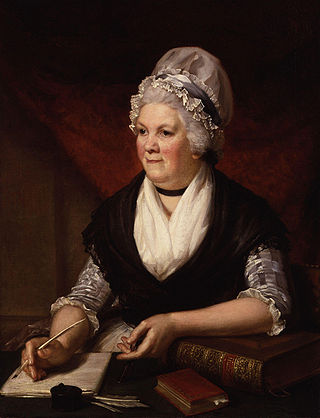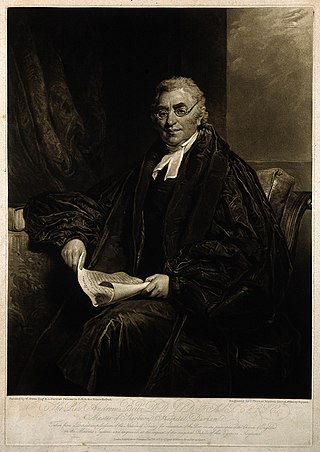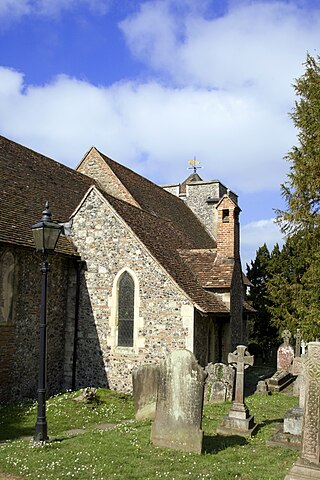Related Research Articles

Nonconformists were Protestant Christians who did not "conform" to the governance and usages of the state church in England, and in Wales until 1914, the Church of England.

Thomas Burgess was an English author, philosopher, Bishop of St Davids and Bishop of Salisbury, who was greatly influential in the development of the Church in Wales. He founded St David's College, Lampeter, was a founding member of the Odiham Agricultural Society, helped establish the Royal Veterinary College in London, and was the first president of the Royal Society of Literature.

Joseph Lancaster was an English Quaker and public education innovator. He developed, and propagated on the grounds both of economy and efficacy, a monitorial system of primary education. In the first decades of the 19th century his ideas found application in new schools established in growing industrial centres.
The Presbyterian Church of Wales, also known as the Calvinistic Methodist Church, is a denomination of Protestant Christianity based in Wales.

The Reports of the Commissioners of Inquiry into the State of Education in Wales, commonly referred to in Wales as the "Treason of the Blue Books" or "Treachery of the Blue Books" or just the "Blue Books" are a three-part publication by the British Government in 1847, which caused uproar in Wales for disparaging the Welsh; being particularly scathing in its view of the nonconformity, the Welsh language and the morality of the Welsh people in general. The Welsh sobriquet Brad y Llyfrau Gleision was from the name of a play satirising the reports, and those who gave evidence to the inquiry, which was published seven years after the reports. The Welsh Academy Encyclopaedia of Wales says that the name "took hold of the public imagination to such an extent that ever since the report has been known by that name".

The British and Foreign School Society (BFSS) was founded in the early 19th century to support free and non-denominational British Schools in England and Wales. These schools competed with the National schools run by the National Society for Promoting Religious Education, which had the support of the established Church of England, the local parishes, and Oxford and Cambridge universities. Both institutions promoted the monitorial system, whereby few paid teachers supervised the senior students who in turn taught the younger students. After the state assumed responsibility for elementary education in 1870, British schools were transferred to local school boards.

Sarah Trimmer was an English writer and critic of 18th-century British children's literature, as well as an educational reformer. Her periodical, The Guardian of Education, helped to define the emerging genre by seriously reviewing children's literature for the first time; it also provided the first history of children's literature, establishing a canon of the early landmarks of the genre that scholars still use today. Trimmer's most popular children's book, Fabulous Histories, inspired numerous children's animal stories and remained in print for over a century.

Andrew Bell was a Scottish Anglican priest and educationalist who pioneered the Madras System of Education in schools. He was the founder of Madras College, a secondary school in St Andrews, and helped fund other schools.

Religion in Wales has become increasingly diverse over the years. Christianity was the religion of virtually all of the Welsh population until the late 20th century, but it rapidly declined throughout the early 21st century. Today, a plurality (46.5%) of people in Wales follow no religion at all.

The Education Act 1902, also known as the Balfour Act, was a highly controversial Act of Parliament that set the pattern of elementary education in England and Wales for four decades. It was brought to Parliament by a Conservative government and was supported by the Church of England, opposed by many Nonconformists and the Liberal Party. The Act provided funds for denominational religious instruction in voluntary elementary schools, most of which were owned by the Church of England and the Roman Catholics. It reduced the divide between voluntary schools, which were largely administered by the Church of England, and schools provided and run by elected school boards, and reflected the influence of the Efficiency Movement in Britain. It was extended in 1903 to cover London.
The Church Burgesses, formerly known officially as the Twelve Capital Burgesses and Commonalty of the Town and Parish of Sheffield, are a charitable organisation in the city of Sheffield in South Yorkshire.
The history of education in England is documented from Saxon settlement of England, and the setting up of the first cathedral schools in 597 and 604.

A National school was a school founded in 19th-century England and Wales by the National Society for Promoting Religious Education. These schools provided elementary education, in accordance with the teaching of the Church of England, to the children of the poor. Together with the less numerous British schools of the British and Foreign School Society, they provided the first near-universal system of elementary education in England and Wales.

William Richards was a Welsh Baptist minister; he spent much of his life in King's Lynn, in Norfolk, and wrote a history of the town. His other publications included a Welsh-English dictionary.
John Griffith was among the most prominent clergymen in industrial south Wales during the second half of the nineteenth century. He was rector of Aberdare from 1846 until 1859. From 1859 until his death in 1885 he was vicar of Merthyr Tydfil where he proved a strong supporter of workers' rights and, by the end of his life a supporter of the disestablishment of the Church of England in Wales. This reflected the way in which he gradually abandoned the strong Tory principles that he espoused at the beginning of his career at Aberdare. He died on 24 April 1885.

Elementary schools were the first schools in England and Wales intended to give a basic education to the children of working class families. At the start of the 19th century, the only schooling available to these young people was run by private concerns or by charities, and was often of a very poor standard. In the first decades of that century, a network of elementary schools was established by societies backed by the Christian churches. In an effort to expand this "voluntary" system, the government made grants available to these societies, initially for new school buildings but later towards their running costs. It became apparent that although this system worked reasonably well in rural communities, it was far less successful in the rapidly expanding industrial cities, and that Britain was falling behind the rest of the developed world. In 1870, an act of parliament established elected school boards throughout England and Wales, which were empowered to create secular "board schools" funded by local taxation where there was no provision by the church societies. Further legislation made school attendance compulsory, and eventually free of charge. The problem of how the education of older pupils should be managed was solved by abolishing school boards in 1902 and passing responsibility to local councils. Elementary schools were eventually replaced in 1944 by the system of primary and secondary education.
Nonconformity was a major religious movement in Wales from the 18th to the 20th centuries. The Welsh Methodist revival of the 18th century was one of the most significant religious and social movements in the modern history of Wales. The revival began within the Church of England in Wales, partly as a reaction to the neglect generally felt in Wales at the hands of absentee bishops and clergy. For two generations from the 1730s onwards the main Methodist leaders such as Howell Harris, Daniel Rowland and William Williams Pantycelyn remained within the Church of England, but the Welsh revival differed from the Methodist revival in England in that its theology was Calvinist rather than Arminian. Methodists in Wales gradually built up their own networks, structures, and meeting houses, which led, at the instigation of Thomas Charles, to the secession of 1811 and the formal establishment of the Calvinistic Methodist Presbyterian Church of Wales in 1823.

The history of Christianity in Britain covers the religious organisations, policies, theology and popular religiosity since ancient history.

The Reports on the Education of the Lower Orders were published between 1816 and 1819 by a select committee of the House of Commons under the chairmanship of Henry Brougham. The committee made only the second ever government inquiry into education, as it comprehensively investigated the provision of education for poor working class children in Great Britain during the early 19th century. The reports exposed the inadequate provision of schooling and the maladministration of charitable funds given for educating the poor. It was eventually used to justify the first state intervention into English and Welsh education in 1833 when the Treasury started to help fund the badly needed construction of new school-houses through an annual grant. It also started a parliamentary commission of inquiry into improving charitable foundations which eventually led to formation of present-day charities commission.
The history of education in Wales from 1701 to 1870 covers the various forms of education offered in Wales during the 18th and early-to-mid 19th century. This period saw an expansion in access to formal education, though schooling was not yet universal.